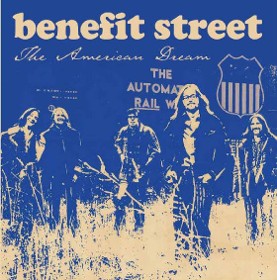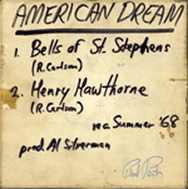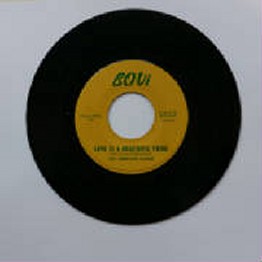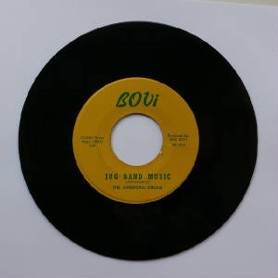The Stories Behind the Songs
by Paul Payton

Hear samples of all the songs at http://www.cdbaby.com/cd/BenefitStreet
The Bells of St. Stephen’s When I first joined the American Dream, this is the song I wanted to play with them. It was slated to be the follow-up to "Love Is A Beautiful Thing," our local single that hit #8 in Rhode Island at the end of 1967. As a radio station Music Director and DJ myself, I sensed that this was a hit in the making, so I took the tape to Jimmy Israeloff, who owned the Beacon Record Shop and who became our manager, to ask him to release it as a local single. I still believe that had it come out, it would have transitioned to be a national hit and would have made our career. My belief in its timelessness is supported by the remake by my new band with the song's writer, Rob Carlson & Benefit Street, on our new 2011 CD, 42 years after the original group last played it. The spare but effective organ is by Bill Bird, who was in the American Dream for the summer of 1968, but I wish I’d been on this session (nothing personal, Bill!) as this track is still magic to my ears. The Byrdsy vocals, chiming guitars and melodic interplay with the Farfisa organ give it both a timeless texture and a firm footing in the '60s. Every phrase of the melody is a hook, and the spirit of the real bells in the real church permeates the recording. The topic is also universal; as legendary folk artist Tom Paxton once wrote, “Everyone loves songs of leaving, but nobody likes to say goodbye.”
-------
For a view of the interior of St. Stephen's Episcopal Church in Providence, RI, click here. For its history and historic photos, click here.
 A tape box is as close as the "second single" ever came to release - until now.
A tape box is as close as the "second single" ever came to release - until now.
Henry Hawthorne A “word salad” that cooks; Rob Carlson’s surrealistic lyrics come thick, fast and harmoniously. Here in the Dream’s original version, guitarist Al Silverman’s searing acid-soaked lead sparkles –Al had built a custom fuzzbox for this session, and Rob once commented that it was the only time it worked perfectly. The vocal depth of this incarnation of the band is on full display in Mike and Rob’s double lead and their full harmonies with Dave. Benefit Street’s version appears later on the disc.
 #8 on WICE, Providence, 12/67
#8 on WICE, Providence, 12/67
Love Is a Beautiful Thing Part of what defines a band is the songs and the artists that it chooses to cover, We tried to be both tasteful and hip in our choices of both. This Young Rascals track was a live smash and a logical choice for the Dream’s first (and only) single. Unfortunately – not the band’s fault – the Atlantic pressing plant, which manufactured for Bovi Records, crush-compressed the highs which were fully in place on the now-lost master tape. This dub from a mint-minus original pressing reaches the limits of technology to re-expand the sound. Even with the sonic limitations, this was a legitimate and well-deserved top ten hit in Rhode Island.
Jug Band Music The single’s B-side is a John Sebastian composition from The Lovin’ Spoonful’s “Daydream” album. It’s a rollicking performance despite the limited highs, and the Dream got some radio exposure on this side as well. Rob handles the lead vocal.
 ..."The B-side of our platter"
..."The B-side of our platter"
Seven Years The band changed several members and its name, and the sound changed as a result. The memorable melody, soaring chorus and loving lyrics made this Rob Carlson original one of the brightest jewels in Benefit Street’s crown. Josh Barrett plays the recorder. I think this is a perfect wedding song. In fact, my wife Bette and I played this recording at our own wedding 14 years after the band broke up – although we had only been dating for six years, not seven. (Coincidentally, Bette was also the voice-over on Benefit Street’s 1971 demo tape for clubs and concerts.) To quote Rob’s lyrics, “Seven times our seven years' time, and I can tell, you'll be old and fragile, like Dresden; and I'll be an antique tunesmith then, with antique songs to sell…” The exact number may be a little off, but as I update this in 2019, I’m still playing in a band with Rob (the new Benefit Street is now nine years along), and Bette and I are still very happily married. I guess some things are meant to last.
Cowboy Stuff This sweet country-flavored leaving song is our only recorded lead vocal by guitarist Josh Barrett. Although the track speaks eloquently for itself, I wish we had the master tapes so we could give this the fuller mix it deserves.
Joshua One of Rob’s several recorded reflections on spirituality:
"Everybody had the same disagreement
Wonderin' why the walls had fell
Was it that the man played like an angel,
Or did he play like hell?"
This song gave Rob a good excuse to bring out his trombone, always a crowd-pleaser. I think this is another of our songs that has stood the test of time very well, but Rob's trombone-playing days ended when someone fell onto it and bent the slide and we retired this from our setlist.
Gingerman A beautiful ballad that debuted with The American Dream, this was our first Benefit Street studio recording, produced by Martin Mull. Marty’s band, Soup, and the American Dream used to borrow equipment from each other in those “broke old days.” He went on to have several music-comedy albums and to become a regular on the TV series, “Mary Hartman, Mary Hartman,” “Fernwood 2-Night.” and “Roseanne,” among others. He is also a well-regarded painter. We went on to "do other things," but we can say that “we knew him when.” I hope he remembers us!
Sharon’s Tune Our Byrds-Poco-Buffalo Springfield influences are showing, as is Rob's sense of a good hook. Josh Barrett comments: "We met Sharon when Benefit Street was just starting out and Rob wrote this song for her. She and I later married and divorced after a few years." The vocal harmonies are by Dave (top of the vocal stack) and Josh.
Think I Must Be Going My music, Rob’s lyrics. I heard Neil Young’s “I Am a Child” and thought, “I wish I’d written that,” so I tried to, but it came out like this instead. In my head, there’s a chorus humming replacing the organ part. Also, Rob was also going to write lyrics for a third verses. Neither humming nor lyrics happened, but I still like the song, and he did a great job singing it.
Daddy Was an Obelisk “Hey, Rob, we need a get-it-on song.” “OK, I’ll write one.” More about style than substance, the musicianship carries the track. Josh does a really nice Wes Montgomery-style guitar part in the bridge while Tim works his jazz chops on the drums.
Holy Roller Once upon a time, skins were thicker, religion was a private matter, and those who courted hypocrisy in religion’s name were fairer game for satire than they may be today. “I don’t care what you say, just what you do” – still good words to live by. We could take the fade and jam it all night if/when we had to.
20 Pound Turkey Country instrumentals with "real good playin'" tend to be timeless, and this, our "break song" featuring Rob on lead guitar, qualifies. It worked so well that we decided to record it. WBRU gave it huge exposure since it was a perfect track to fill the space between the hour’s last set of music and the newscast. The song title came from a Thanksgiving gift manager Jimmy Israeloff secured for us one hungry New England autumn.
Voice of Eternity It was the era of the “rock opera,” and you can hear The Who’s influence throughout this episodic product of its time. Social commentary ruled the musical day. One favorite line: “I’m so clean, I’m so in-between, so laudably liberal.” When this was written, “liberal” was a pejorative for bland compromise – one needed to be "progressive" to be authentic. The meaning of certain words certainly has changed over time! In hindsight, this wasn't our favorite song; while the message was strong, the lyrics may have pulled too many punches - or perhaps not enough.
Follow Down Rob’s “Woodstock” observations from a couple of years afterward, this epic could really rouse the live audiences. This is another track for which I wish we had the master tapes to re-mix to more closely achieve its fuller and more dramatic live sound. Procol Harum was a big influence on my keyboard work, which you can hear in the grand final section. An anthem for the era.
See It Together On April 30, 1970, in a basement room in a Brown dorm, Rob and I recorded a very productive night’s worth of demos of songs proposed for the band to play. The final versions of several are on this CD, including “Follow Down” and “Seven Years.” This beautiful song made it to live gigs, but never into a studio until now. For this album I took the original demo recording and tried to do what we might have done with enough time and money to work with. (Special thanks to engineer Aaron Kamphuis without whom this track never would have come together.)
Henry Hawthorne Benefit Street’s version of the American Dream’s song is a little slower, less psychedelic, slightly reinvented. From Benefit Street’s first session in 1969 at Intermedia, probably Boston’s finest recording studio at the time, this Martin Mull-produced track was going to be the flip side of a "Gingerman" single that never came out.
Journey Home One night in 1971, I dreamed this song in its entirely. Immediately upon awakening, I threw a switch and mumbled it whole into a tape recorder set up next to my bed. We played it live many times, but I left the band before we took it into a studio. In 1973, I tried to recreate – with overdubbing – how we played it on stage. Rob sang the lead live; I'm negotiating it here. The background vocals are by Ellen Harvey, a fine singer, songwriter and musician in her own right, who I last heard was in Utah. (If you're reading this, Ellen, please contact me.)
Benefit Street & Me Rob wrote this wistful song the year after Benefit Street ended its run in 1972; in 2009, with this album in the works, he asked if any of us wanted to add a part to his personal reflection on the band and the actual Benefit Street scene. All six of our last recording unit said yes, adding parts with one, two, or three of us at a time in Rob’s studio. (The reference to "sandwiches down at Joe's" is to what was the East Side's, if not the city's, best sandwich shop; Dewey Dufresne, the owner and later a New York "celebrity chef," kept us alive during our financially-shaky beginnings. The shop has been known as "Geoff's" for years; there never was a real "Joe.") This track is as close to a full band reunion as we’ve had so far, but as Tim Jackson asked, “In whose living room will we have the reunion tour?” While we figure out the venue, one-third of Benefit Street – Rob and me – are working as half of a new band, Rob Carlson & Benefit Street, with Vin Pasternak, good friend and string wizard, and contributions from Rob's multi-talented son Sam Carlson on drums. The new band has updates of three of this album's songs – “The Bells of St. Stephen’s,” "Seven Years" and this one on our first album. We invite you to come out and hear us when we play in your area. The years may have moved along, but our enthusiasm hasn’t dimmed a bit!